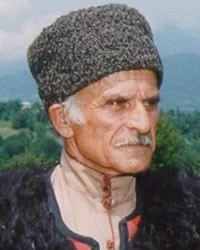Abaza in Türkiye (Turkey)

Photo Source:
Lawrence Jatker
|
Send Joshua Project a map of this people group.
|
| People Name: | Abaza |
| Country: | Türkiye (Turkey) |
| 10/40 Window: | Yes |
| Population: | 14,000 |
| World Population: | 72,000 |
| Primary Language: | Abaza |
| Primary Religion: | Islam |
| Christian Adherents: | 0.20 % |
| Evangelicals: | 0.00 % |
| Scripture: | Portions |
| Ministry Resources: | Yes |
| Jesus Film: | No |
| Audio Recordings: | No |
| People Cluster: | Caucasus |
| Affinity Bloc: | Eurasian Peoples |
| Progress Level: |
|
Introduction / History
Most of the world's Abazas live in the nations of Russia and Georgia. However, a significant community can be found living in the neighboring country of Turkey. While they are scattered throughout much of the country, the largest concentration of Abazas is located along the Black Sea coast in north-central Turkey.
In the fifteenth century, the Ottoman Turks conquered the Caucasus Mountain region of Russia and Georgia. At that time, many of the Abazas converted from Christianity to Islam. The Russians, however, gradually took control of the region, and by the late 1800s, they dominated the Muslim Abaza. Feeling threatened by Christian Russia, many Abazas accepted an offer of refuge from Muslim Turkey and moved there. In recent years, the Abazas have begun to be assimilated into mainstream Turkish culture and, as a result, are in danger of losing their identity as a separate ethnic group in Turkey.
What Are Their Lives Like?
Little is known about the lives of the Abazas in Turkey; however, it is known that they have been largely assimilated into Turkish culture. Assumedly, they live much like other rural Turks throughout Turkey, although they have attempted to preserve their traditional culture through festivals and organizations. In addition, the Abazas have retained their native tongue, which is one of the most complex languages on earth. This language has more than 50 consonants, with numerous pronunciations for each one. Because of the difficulty of their own language, the Abazas are adept at learning other languages.
The great majority of Abazas are farmers and livestock producers. Tobacco is their major crop, but tea, fruits, and vegetables are also grown. Cattle production is another important aspect of the Abaza economy. Because of their livelihood, nine out of ten Abazas live in rural areas. Their houses are built of brick or concrete and have either one or two stories. Most homes have verandas and balconies, where families enjoy spending time in good weather.
Most Abaza women marry in their early twenties, but men often wait until their thirties or even forties. Marriage is forbidden with all possible relatives: individuals are not allowed to wed anyone with the same surname as any of their grandparents. In the past, marriages were arranged, but today men and women are free to select their own mates. Occasionally, a young woman will agree to a marriage, but her parents will not. If this occurs, the young man and his friends kidnap the young woman and take her to his house, where the marriage ceremony is performed. Whether or not the bride was abducted, her family does not attend the wedding. She is required to stand silent and secluded while her husband's family feasts and celebrates.
Abazas highly value hospitality. A guest is given the same respect as a father or grandfather and is seated at a place of honor at the table. The arrival of a guest is accompanied by a ritual feast. Over wine, hosts and guests go through rounds of toasts, honoring each other and getting to know each other better. Providing hospitality in this way is a source of family pride.
What Are Their Beliefs?
Most Abazas are Sunni Muslims. Islam is a religion of works based on five basic "pillars," or requirements. Muslims must affirm that "there is no god but Allah, and Mohammed is his prophet." They must pray five times a day, facing Mecca, Islam's holy city. They are also required to give alms to the poor, fast during the month of Ramadan, and try to make at least one pilgrimage to Mecca in their lifetime.
What Are Their Needs?
The Abazas of Turkey desperately need to hear of Jesus as Savior. Turkey is officially a secular state with only a limited amount of religious freedom. Therefore, Christians are not completely free to share their faith.
Prayer Points
Ask the Lord to call Christians to share Christ with the Abaza people in Turkey.
Pray for Abaza leaders to have dreams of the risen Christ, opening their hearts to the only savior.
Pray that Christian literature and media will be made easily available to the Abazas.
Ask God to raise up intercessors who will stand in the gap for the Abazas in Turkey.
Pray for Abaza disciples who will make more disciples.